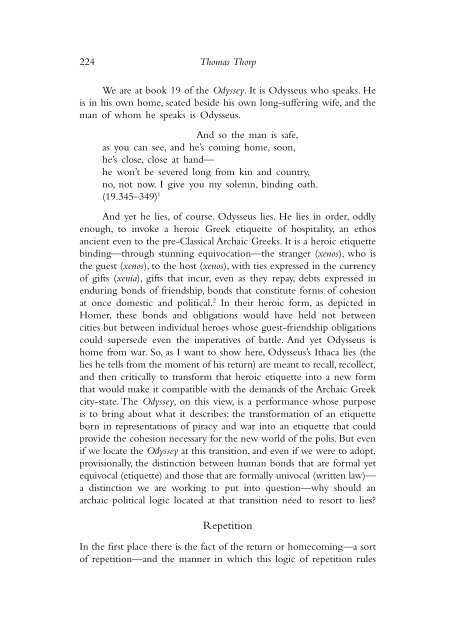Create successful ePaper yourself
Turn your PDF publications into a flip-book with our unique Google optimized e-Paper software.
224 Thomas Thorp<br />
We are at book 19 <strong>of</strong> <strong>the</strong> Odyssey. It is Odysseus who speaks. He<br />
is in his own home, seated beside his own long-suffering wife, and <strong>the</strong><br />
man <strong>of</strong> whom he speaks is Odysseus.<br />
And so <strong>the</strong> man is safe,<br />
as you can see, and he’s coming home, soon,<br />
he’s close, close at hand—<br />
he won’t be severed long from kin and country,<br />
no, not now. I give you my solemn, binding oath.<br />
(19.345–349) 1<br />
And yet he lies, <strong>of</strong> course. Odysseus lies. He lies in order, oddly<br />
enough, to invoke a heroic Greek etiquette <strong>of</strong> hospitality, an ethos<br />
ancient even to <strong>the</strong> pre-Classical Archaic Greeks. It is a heroic etiquette<br />
binding—through stunning equivocation—<strong>the</strong> stranger (xenos), who is<br />
<strong>the</strong> guest (xenos), to <strong>the</strong> host (xenos), with ties expressed in <strong>the</strong> currency<br />
<strong>of</strong> gifts (xenia), gifts that incur, even as <strong>the</strong>y repay, debts expressed in<br />
enduring bonds <strong>of</strong> friendship, bonds that constitute forms <strong>of</strong> cohesion<br />
at once domestic and political. 2 In <strong>the</strong>ir heroic form, as depicted in<br />
Homer, <strong>the</strong>se bonds and obligations would have held not between<br />
cities but between individual heroes whose guest-friendship obligations<br />
could supersede even <strong>the</strong> imperatives <strong>of</strong> battle. And yet Odysseus is<br />
home from war. So, as I want to show here, Odysseus’s Ithaca lies (<strong>the</strong><br />
lies he tells from <strong>the</strong> moment <strong>of</strong> his return) are meant to recall, recollect,<br />
and <strong>the</strong>n critically to transform that heroic etiquette into a new form<br />
that would make it compatible with <strong>the</strong> demands <strong>of</strong> <strong>the</strong> Archaic Greek<br />
city-state. The Odyssey, on this view, is a performance whose purpose<br />
is to bring about what it describes: <strong>the</strong> transformation <strong>of</strong> an etiquette<br />
born in representations <strong>of</strong> piracy and war into an etiquette that could<br />
provide <strong>the</strong> cohesion necessary for <strong>the</strong> new world <strong>of</strong> <strong>the</strong> polis. But even<br />
if we locate <strong>the</strong> Odyssey at this transition, and even if we were to adopt,<br />
provisionally, <strong>the</strong> distinction between human bonds that are formal yet<br />
equivocal (etiquette) and those that are formally univocal (written law)—<br />
a distinction we are working to put into question—why should an<br />
archaic political logic located at that transition need to resort to lies?<br />
Repetition<br />
In <strong>the</strong> first place <strong>the</strong>re is <strong>the</strong> fact <strong>of</strong> <strong>the</strong> return or homecoming—a sort<br />
<strong>of</strong> repetition—and <strong>the</strong> manner in which this logic <strong>of</strong> repetition rules
















